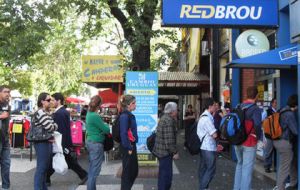MercoPress. South Atlantic News Agency
Cristina Fernandez administration limits overseas dollar extractions to a minimum
 Argentine visitors queuing in Uruguay to extract ‘Colonia dollars’
Argentine visitors queuing in Uruguay to extract ‘Colonia dollars’ Continuing with the so called ‘dollar clamp’ Argentine institutions issuing credit cards will further limit the extraction of dollars from automatic cashiers: travellers to neighbouring countries will only be allowed 100 dollars every three months and those visiting non neighbouring countries, 800 dollars per month.
The measures are the result of a request from the Argentine Central bank and were announced late Wednesday. Further details are expected on Thursday.
The new credit card conditions are geared to impede the flight of foreign currency from Argentina, particularly the so called “Colonia dollar” which refers to day-trips to neighbouring Uruguay to extract greenbacks.
Although this overseas operation already has a 20% tax, it does not need to fill any forms or wait for a favourable answer from the Argentine Central bank, and most important means purchasing dollars at the net equivalent of 6.20 Pesos, when in the Buenos Aires parallel market the ‘blue’ greenback currently stands at 8.90 Pesos having previously reached a peak of 10.40 Pesos.
The Argentine central bank in April started sending letters to all holders of credit cards that had extracted dollars in cash overseas demanding they explain how they spent the money.
The bank was already working along this line by demanding Argentine private banks to impose a 15.000 dollars limit on overseas extractions. Later it requested all credit card holders who collected more than 5.000 dollars, from September/November last year or 10.000 dollars during the first quarter of this year to render a precise detail, supported with documents, of how the hard currency was spend.
The latest decision is anticipated to have a huge impact on neighbouring countries such as Uruguay, Chile and Brazil where Argentine tourists flock during summer months. Since Argentine Pesos are not accepted in the region, or anywhere but in Argentina, and dollars are hard to come by, not even with a credit card, tourism in Mercosur countries is seriously threatened.
Argentina since the default of 2001/02 has not been able to return to voluntary money markets and must appeal to budget and trade surpluses, which were effective during the first years of the Kirchner couple rule. However extravagant domestic expenditure to ensure political support, unorthodox polices and a falling trade surplus have seen the Central bank lose international reserves.
Faced with this scenario and a growing distrust of current policies and a steady capital flight, the Cristina Fernandez administration has imposed increasingly tighter rules regarding hard currency, among which banning new savings in dollars and only admitting contracts in Pesos which has strongly limited the real estate market. Likewise happens with tourists wanting to travel overseas and in need of foreign currency.
Next October mid term elections are scheduled and Cristina Fernandez could lose the working majority she currently enjoys in Congress if there’s not a rebound of the slowing economy. For this the whitewashing bill under discussion in Congress and dollar clamp to ensure sufficient reserves in the Central bank to pay for imports and honour debt payments.




Top Comments
Disclaimer & comment rules-

-

-

Read all commentsWow it looks like things are going from disaster to full collapse.
May 23rd, 2013 - 07:21 am 0Now where is Danny to lecture us on economics LOL!
Did they just pyongyang?
May 23rd, 2013 - 08:43 am 0Always look on the bright side of things. There wasn't much to do in Colonia anyway and the ferry ride would sometimes make a lot of people seasick.
May 23rd, 2013 - 10:24 am 0Staying home isn't so bad.
Commenting for this story is now closed.
If you have a Facebook account, become a fan and comment on our Facebook Page!